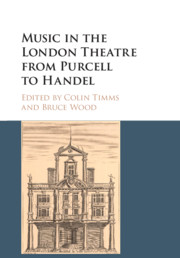Introduction
Published online by Cambridge University Press: 10 June 2017
Summary
The period of western music in which Purcell's and most of Handel's works were composed is characterised above all by the emergence, development and widespread dissemination of opera. Born in Italy at the end of the sixteenth century, this form of theatre music flew the nest of aristocratic courts in the seventeenth and, thanks to the efforts of itinerant companies of actor-musicians, gradually moved into public theatres throughout the peninsula. It also crossed the Alps to Catholic courts in the Empire, initially Vienna and Munich, and examples of opera were taken to the French court by visiting Italians, such as Luigi Rossi and Cavalli. At Versailles a local dialect of the operatic language was later coined by another Italian, Giovanni Battista Lulli, who had settled in Paris in 1646 and became known as Lully.
The reception of opera in England was less straightforward. In the early seventeenth century the strong traditions of spoken drama (often with songs) and court masque militated against the adoption of a further kind of theatre music. During the Commonwealth, theatres were closed, so it was the courtyard of William Davenant's home in London that served as the venue for the performance of his Siege of Rhodes (1656), now regarded as the first all-sung drama in English. But the genre did not take root. After the restoration of the monarchy the musical theatre continued to be dominated by plays with music (in which the amount of music could, nevertheless, be very substantial) and by masques. The situation appears not to have been altered by Blow's all-sung masque Venus and Adonis (c. 1683) or by Purcell's miniature opera Dido and Aeneas (?1684), neither of which received a public performance at the time. There seem to have been several reasons for this lack of interest. Opera was regarded as intrinsically Italian and Catholic, and therefore, in some quarters, suspect. So far as the English were concerned, it was ridiculous for the part of an ancient hero like Alexander the Great to be sung on stage by a castrato at a pitch generally associated with women, and the castration of young male singers was considered an offence against nature.
- Type
- Chapter
- Information
- Publisher: Cambridge University PressPrint publication year: 2017

